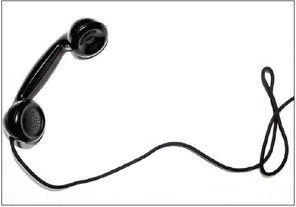Protect yourself against scam callers who pretend to be family


By Laurie Bullock
laurieb@lwsb.com
Bree Adams from Mutual 7 said that she had received a call from a young man who asked her, “Don’t you recognize my voice?” She was suspicious, but asked if the caller was her grandson.
Adams said the man claimed to be her grandson and went on to say that he was in trouble. “He said that he was not doing well and asked me not to tell anyone because he didn’t want his father to get upset,” Adams said. The caller told her that while he was driving home under the influence of alcohol, he ran over someone and broke his nose on the steering wheel. He told Adams that he was calling from the local jail, which is why she didn’t recognize the number, and needed bail money.
Adams suspected something was fishy about the call and hung up. She dialed back and the number the scammer was calling from was actually registered to a spa, not a jail. Adams did the right thing in not reacting quickly and checking to see if the smaller details of the story such as the jail’s phone number were legitimate.
Adams’ experience isn’t unusual. Unfortunately, there are scammers out there who will try to take advantage of a grandparent’s love of their family to steal money or personal information from them. Some warning signs that the family emergency call you are receiving might be from a scammer are:
• The person claiming to be your grandchild asks you to send money immediately and provides details on how to do so such as sending prepaid cards to a particular Western Union office.
•The call comes late at night or early in the morning. While some legitimate emergencies do happen late at night, most scammers will try to call you at a time when you’re less likely to think critically.
Below are some basic do’s and don’ts from AARP if you receive a call that might be a family emergency scam: Do set the privacy settings on your social media accounts so that only people you know can access your posts and photos. Scammers search social networks for family information they can use to fool you.
Don’t drop your guard because the number on your caller ID looks familiar. Scammers can use technological tricks to make it appear that they’re calling from a trusted number, the Federal Communications Commission warns.
Do ask questions someone else is unlikely to be able to answer, such as the name and species of your grandchild’s first pet.
Don’t volunteer information. Scammers fish for facts they can use to make the impersonation believable. If the caller says, “It’s me, Grandpa!” don’t say your grandchild’s name. Wait for the caller say it.
Do say you’ll call right back, then call your grandchild’s usual phone number. With luck, he or she will answer, and you’ll know that the supposed emergency call is a scam.
Don’t let a caller rush you into making a decision.
Do contact other family members or friends and see whether they can verify the story. Scammers plead with you to keep the emergency a secret precisely so you won’t try to confirm it.
Don’t send cash, wire money, or provide numbers from gift or cash-reload cards to a person claiming to be a grandchild. Scammers prefer those payment methods because they’re difficult to trace.
Do call the relevant law enforcement agency if you speak to someone who claims to be a police officer to verify the person’s identity and any information they’ve given you.
Don’t panic, no matter how dire the grandchild’s predicament sounds. Scam artists want to get you upset to distract you from spotting the ruse.
Do trust your instincts. If something doesn’t feel right, it probably isn’t.




